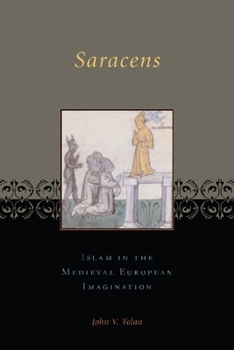Saracens: Islam in the Medieval European Imagination
Select Format
Select Condition 
Book Overview
In the first century of Islam, most of the former Christian Roman Empire, from Syria to Spain, was brought under Muslim control in a conquest of unprecedented proportions. Confronted by the world of Islam, countless medieval Christians experienced a profound ambivalence, awed by its opulence, they were also troubled by its rival claims to the spiritual inheritance of Abraham and Jesus and humiliated by its social subjugation of non-Muslim minorities. Some converted. Others took up arms. Still others, the subjects of John Tolan's study of anti-Muslim polemics in medieval Europe, undertook to attack Islam and its most vivid avatar, the saracen, with words.
In an effort to make sense of God's apparent abandonment of Christendom in favor of a dynamic and expanding Muslim civilization, European writers distorted the teachings of Islam and caricatured its believers in a variety of ways. What ideological purposes did these portrayals serve? And how, in turn, did Muslims view Christianity? Feelings of rivalry, contempt, and superiority existed on both sides, tinged or tempered at times with feelings of doubt, inferiority, curiosity, or admiration. Tolan shows how Christian responses to Islam changed from the seventh to thirteenth centuries, through fast-charging crusades and spirit-crushing defeats, crystallizing into polemical images later drawn upon by Western authors in the fourteenth to twentieth centuries. Saracens explores the social and ideological uses of contempt, explaining how the denigration of the other can be used to defend one's own intellectual construction of the world.Format:Paperback
Language:English
ISBN:0231123337
ISBN13:9780231123334
Release Date:June 2002
Publisher:Columbia University Press
Length:400 Pages
Weight:1.20 lbs.
Dimensions:0.9" x 6.2" x 9.1"
Age Range:22 years and up
Grade Range:Postsecondary and higher
Customer Reviews
3 ratings
Elegant, thorough, and substantive investigation of a complex topic
Published by Thriftbooks.com User , 14 years ago
Tolan's _Saracens_ and his follow-up, _Sons of Ishmael_, are sophisticated, meticulous, and elegant investigations into a complex and shifting collective of medieval attitudes, texts, and sources. His preference for utilizing less-regularly cited primary documents is a marvelous gift, and he readily references other, more 'mainstream' works, which enables a scholar to follow his research trail in a logical and clear fashion. He avoids over-theorization in favor of summation and presentation, both needed and appreciated steps taken while he is writing formational texts in a growing field of study. Any student or scholar working on or interested in the formulation of medieval visions and attitudes towards Islam will be indebted to Tolan's careful scholarship. Highly recommended.
hi dad
Published by Thriftbooks.com User , 22 years ago
My dad wrote this book that is why it is so great
Impeccable Research, But At Times Slanted
Published by Thriftbooks.com User , 22 years ago
The role of the Saracen(Arab) in literature has been a perennial theme of medieval studies and culture, and particularly in the means by which alterity(or Otherness) is constructed and perceived. In Tolan's book, Tolan reveals a range of medieval attitudes towards the Saracen as the "Other", whether a demonized Other in the eyes of the Latin West, an honourable Other who possesses immense valour and integrity of character in the eyes of Eastern Monophysites at quarrel with the Roman Catholic Church, or a stubborn and illogical Other which would not convert to Christianity given the polemical and apologetical tools harnessed against the Islam faith. It is in this range of medieval attitudes towards the Saracen as "Other" that modern issues like the status of dispossession faced by Arabs in the modern Western world and the heightened Christian-Muslim debates after September 11 in USA find their ideological and historical roots. Tolan's research is impeccable in its consideration of various sources ranging from texts as obscure as the Apocalypse of Pseudo-Methodius to the writings of John of Damascus, from Isidore of Seville's anti-Jewish and Christian-eschatological discourses to Ramon Llul's "A Debate between Three Wise Men", from Aquinas' Dominican discourses to Spanish-Castilian historical sources and hagiographies and Hrotswitha of Gandersheim. One point that might be noticeable in his writing is however a notable contempt for Christendom in the Middle Ages which he actually associates with modern twentieth century Christianity after the 17th century Reformation(catalyzed through Luther, Calvin and Zwingli and the Anabaptist Revolt against church-state structures). This is probably a wrong-headed move in that not only does it appear to be highly ecumenical in its thrust, but that it appears to ignore the historical differences between modern Christianity and medieval Christendom. At times, when using the Dominicans and Franciscans or such to prove how medieval Christians use the Bible as a case for proving first and foremost the nature of Islam as a "heresy" in medieval Christian terms, he is conveying another impression of dislike of modern day Christianity that appears to be more subjective than objectively balanced and weighed out. I would recommend this book for those who are seriously interested in knowing how the configuration of the Saracen as the "Other" in literature of the Christian West and also the East evolved over the centuries from the earlier part of the Middle Ages right through to the High Middle Ages and then 14th century Europe. It does seem however at times, due to the highly emotive content that has a chance to appear every once in a while in some of the chapters, readers should take extra caution and weigh what Tolan says with a grain of salt and some serious reason.






